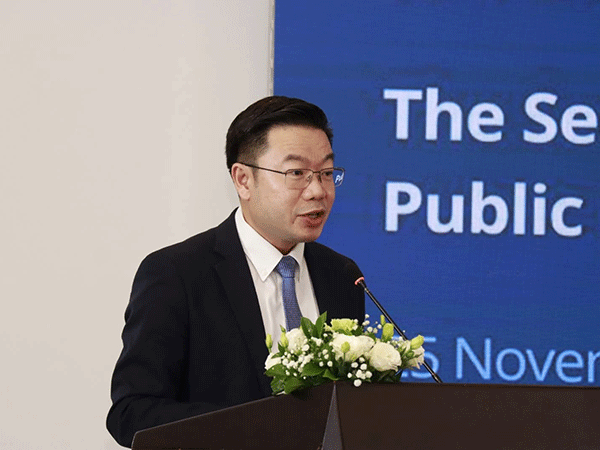 |
Deputy Minister of Finance Soulivath Souvannachoumkham.
|
Laos, key partners advance public debt reform agenda
Public debt management is a priority for Laos as the country intensifies reforms critical to achieving long-term fiscal stability and ensuring a smooth transition from Least Developed Country status.
In light of this, the Ministry of Finance, in partnership with the Asian Development Bank (ADB), International Monetary Fund (IMF), and World Bank, convened the Second High-Level Policy Dialogue on Public Debt Management in Vientiane on Monday.
The gathering brought together senior policymakers, development partners, and regional specialists to accelerate ongoing reforms and reinforce progress recorded over the past two years.
Recent government data shows encouraging improvements in the country’s fiscal position, including the repayment of US$2.45 billion in foreign debt between 2024 and September 2025.
Reform progress in the foreign exchange sector has also supported improved fiscal conditions. Establishment of the Lao Foreign Exchange Market (LFX) has enhanced market transparency, encouraged broader use of the kip, and facilitated local currency settlements with neighbouring countries.
These measures aim to reduce reliance on foreign currencies, strengthen monetary policy effectiveness, and improve exchange rate predictability.
“The government is resolute in advancing reforms that restore macroeconomic stability, strengthen public finances, and ensure that debt management remains transparent and sustainable,” Deputy Minister of Finance Soulivath Souvannachoumkham said.
He highlighted the tangible progress made since the inaugural dialogue in October 2023, noting that inflation fell from 31.2 percent in 2023 to 4.0 percent in October 2025.
The exchange rate has stabilised, revenue collection has improved, and economic growth reached 4.3 percent in 2024, with projections of 4.8 percent for 2025 driven by energy exports, a stronger tourism rebound, and improved investor sentiment.
The government is currently drafting the Medium-Term Debt Management Strategy for 2026-2030 with technical support from ADB, the World Bank, and JICA.
Fiscal consolidation measures, including the restoration of VAT from 7 to 10 percent, have helped boost domestic revenues, while the establishment of the Public Debt Statistics Division has enhanced transparency and reporting.
Oversight of state-owned enterprises, particularly Electricité du Laos (EDL), has been strengthened through mandatory reporting, structured debt monitoring, and a moratorium on new government guarantees to curb the accumulation of high-risk liabilities.
ADB Deputy Director General for Southeast Asia Mr Pavit Ramachandran said “ADB acknowledges the significant steps taken by the Ministry of Finance to strengthen debt management, promote transparency, and improve the legal framework.”
Deputy Minister Soulivath said support from development partners continues to play a key role in advancing Laos’ reform agenda.
Technical assistance from ADB under its programme to enhance debt management and transparency, IMF’s training on macroeconomic forecasting and fiscal risk management, and the World Bank’s analytical support have helped build capacity within the Ministry of Finance and related institutions.
Speakers from Indonesia, Vietnam, Cambodia, the Philippines, Sri Lanka, and international energy institutions shared experiences and lessons that Laos can adapt to strengthen its institutional systems and governance structures.
By Times Reporters
(Latest Update November 27, 2025)
|


